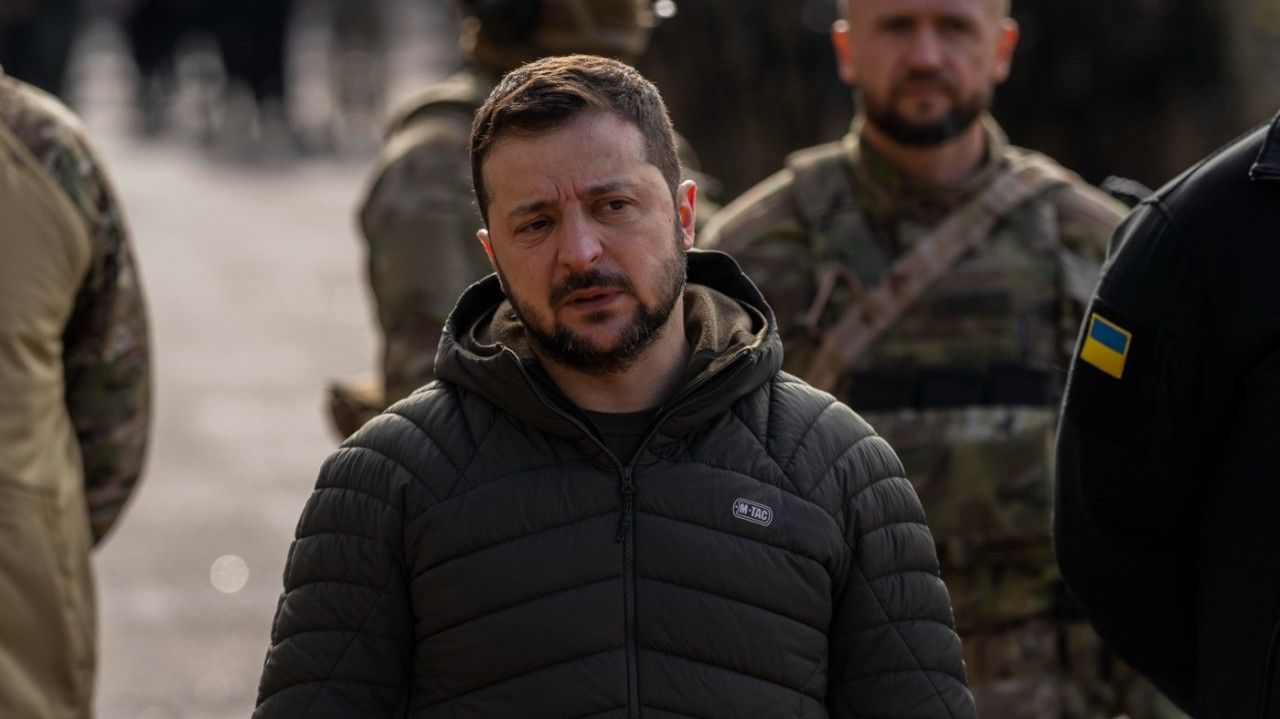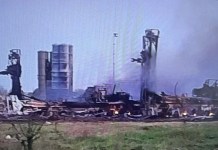Is Ukraine provoking a full-fledged direct war between Russia and NATO? And if it does not succeed, will Ukraine’s credibility in the Western eyes in this age of information war be hampered?
Above all, will Ukraine’s failure adversely affects the inflow of billions of US dollars (in cash and kind), mainly when the Republicans will control the House of Representatives following the US midterm elections?
Since the answers are interrelated, one may begin with the developments over the last five days that have led to these questions.
On Tuesday evening (November 15), an S-300 missile landed in Poland (the Polish village of Przewodow, about six kilometers from the Ukrainian border), killing two people. The missile, initial reports said, had landed next to an area of a farm where employees load and weigh grain, destroying a nearby building.
Zelenskyy Adamant That It Was A Russian Missile
Whose missile was that? Poland, NATO, and the US say that the missile attack appeared unintentional and was probably launched by air defenses in neighboring Ukraine.
“Ukraine’s defense was launching their missiles in various directions, and it is highly probable that one of these missiles, unfortunately, fell on Polish territory,” said Polish President Andrzej Duda. “There is nothing, absolutely nothing, to suggest that it was an intentional attack on Poland,” he asserted.
Similarly, NATO Secretary-General Jens Stoltenberg has said that “preliminary analysis suggests that the incident was likely caused by a Ukrainian air defense missile fired to defend Ukrainian territory against Russian cruise missile attacks.” According to him, “there was no indication this was the result of a deliberate attack,” nor any indication it was a result of “offensive military actions against NATO.”
At the same time, Stoltenberg made it clear that as Ukraine was probably defending against the Russian missile attacks by this defensive missile, it could have been accidentally fired into Polish territory.
However, despite NATO exonerating Ukraine — and even the injured party, Poland accepting the missile strike was an “isolated incident” and reiterating its support for Ukraine — Kyiv continues to defend itself and says it was a Russian attack on Poland.
Ukrainian President Volodymyr Zelenskyy is adamant that Russia fired the missile. And this he continues to say even after US President Joe Biden has dismissed his comments by saying, “Zelenskyy’s comments did not amount to evidence as NATO and Poland concluded that the missile was probably a stray fired by Ukraine’s air defenses.”
Zelenskyy yesterday: “Terror is not limited to our national borders. Russian missiles hit Poland … NATO territory. This is a Russian missile attack on collective security — a very significant escalation. We must act” pic.twitter.com/zylfGdbwzw
— Tom Elliott (@tomselliott) November 16, 2022
It may be noted that soon after the missile attack, Zelenskyy called it a Russian “attack on collective security.” And in a Wednesday morning speech, he called the incident a Russian “missile attack” and said separately that Polish citizens were killed because of “Russian missile terror.”
Ukrainian Foreign Minister Dmytro Kuleba has joined his President, saying, “Russia now promotes a conspiracy theory that it was allegedly a missile of Ukrainian air defense that fell on the Polish theory. Which is not true.”
Zelenskyy is not even impressed by what US President Joe Biden has said in Bali during the recent G-20 summit.
Asked if the missile was fired from Russia, Biden had said: “There is preliminary information that contests that. I don’t want to say that until we completely investigate. But it is unlikely in the minds [sic] of its trajectory that it was fired from Russia.”
BREAKING: Biden says the missile that hit Poland is unlikely to have come from Russia pic.twitter.com/mWaHlBuqgl
— Jack Posobiec ?? (@JackPosobiec) November 16, 2022
But Zelenskyy stresses, “It was not our missile and not our missile strike…. I do not doubt [Tuesday’s] report to me personally — from the Commander of the Air Force to Commander-in-Chief [Valeriy] Zaluzhny — that it was not our missile and not our missile strike.”
And all this despite Russia’s closest point to the blast site in Poland is about 580 kilometers (360 miles) away, far further than the range of the S-300 system, which experts say is around 90 kilometers (56 miles). Incidentally, both Russia and Ukraine possess these S-300 defense systems.
Zelenskyy’s Efforts To Convince The West
Why is Zelenskyy so adamant? He knows that if NATO believes in his version, direct war with Russia by the military alliance could be a logical result.
Poland is a NATO member, and Article 5 of the alliance’s charter states that “an armed attack against one or more of [the members] in Europe or North America shall be considered an attack against them all” and that force can be used in response.
It may be noted that the collective defense clause has been invoked only once in NATO history, after the 9/11 attacks in the United States. NATO forces were subsequently deployed to Afghanistan.

Article 5 says that each member of NATO must take “such action as it deems necessary, including the use of armed force, to restore and maintain the security of the North Atlantic area.” It also authorizes the alliance to launch an armed response, but the wording is broad and leaves room for other types of action.
Article 4 of the NATO charter allows members to bring any issue of concern, especially related to security, for discussion at the North Atlantic Council, the alliance’s political decision-making body.
Article 4 has been invoked seven times since NATO was established in 1949. It was used most recently by Latvia, Lithuania, Poland, Bulgaria, the Czech Republic, Estonia, Romania, and Slovakia to hold meetings after Russia invaded Ukraine.
But Poland did not deem it fit to use this clause after the missile attack on Tuesday, which it described as accidental, and that too by Ukraine, whom it is supporting in the war against Russia.
NATO Vs. Russia The End Goal?
It may be noted, however, that when Russia invaded Ukraine in February, NATO activated its Response Force — a multinational conglomerate of land, air, sea, and special-operations personnel numbering 40,000 — for the first time in its history.
As part of the activation, NATO dispatched troops to countries bordering Russia and Ukraine, including Romania and Hungary, to augment the battle groups already stationed in the Baltic States and Poland.
But NATO will not fight Russia over this missile attack, contrary to what President Zelenskyy might have thought (if at all). On the other hand, his remarks on the incident could negatively impact Ukraine’s credibility “at a pivotal moment in Putin’s deadly war,” according to a senior NATO official.
“This is getting ridiculous. The Ukrainians are destroying [our] confidence in them. Nobody is blaming Ukraine, and they are openly lying. This is more destructive than the missile,” he said.
There are merits in the arguments in certain Western quarters that as propaganda wins have helped Ukraine as much as battlefield victories in garnering support for its war against Russia, a Ukrainian overreaction and dismissal of valid concerns as conspiracy theories on the missile incident in Poland could weaken its credibility at a time when questions have been raised about the value of continued aid.
This apprehension is particularly pertinent now that the Republicans will control the House of Representatives in the United States, which has already given Ukraine over 20 billion dollars and committed to providing nearly 40 billion dollars more in its war efforts.
With record high inflation, political standoff with Russia, and rapidly growing national debt, Republicans and Republican-leaning independents campaigned during the just concluded mid-term elections in the US that Washington is providing too much support for Ukraine in the war.
“I think people are going to be sitting in a recession, and they’re not going to write a blank check to Ukraine,” House Minority Leader Kevin McCarthy, who will now be the House Speaker, recently told the press. “They just won’t do it.”
It may be noted that a far-right faction among the Republicans, including supporters of former President Donald Trump, has increasingly pushed against continued assistance to Ukraine, saying the billions the US has provided to Kyiv is too costly and not worth the risk of sparking a wider conflict with Russia.
In April, ten House Republicans voted against a bill allowing the Biden administration to lend military equipment to Ukraine. The following month, 57 House Republicans voted “no” on a nearly $40 billion aid package for Ukraine. Both measures ultimately passed the chamber, however.
Similarly, the Biden Administration will, in all probability, find ways to meet the new Republican challenge as the majority in the US still support the territorial integrity of Ukraine.
But Zelenskyy is seen to be making Biden’s task a little more challenging with his “irresponsible” utterances.
- Author and veteran journalist Prakash Nanda has been commenting on politics, foreign policy on strategic affairs for nearly three decades. A former National Fellow of the Indian Council for Historical Research and recipient of the Seoul Peace Prize Scholarship, he is also a Distinguished Fellow at the Institute of Peace and Conflict Studies.
- CONTACT: prakash.nanda (at)hotmail.com
- Follow EurAsian Times on Google News





